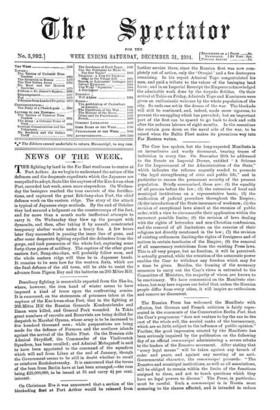The Czar has spoken, but the long-expected Manifesto is an
inconclusive and wordy document, bearing traces of indecision in every line. On December 26th he addressed to the Senate an Imperial Decree, entitled "A Scheme for the Improvement of the Administration of the State," which indicates the reforms urgently needed to promote "the legal strengthening of civic and public life," and in particular to ensure the permanent security of the peasant population. Briefly summarised, these are : (1) the equality of all persons before the law ; (2) the extension of local and municipal institutions on a representative basis ; (3) the unification of judicial procedure throughout the Empire ; (4) the introduction of the State insurance of workmen; (5) the revision of exceptional laws aimed at the enemies of public order, with a view to circumscribe their application within the narrowest possible limits ; (6) the revision of laws dealing with the rights of heterodox and non-Christian confessions, and the removal of all limitations on the exercise of their religions not directly mentioned in the law ; (7) the revision of existing ordinances limiting the rights of foreigners and of natives in certain territories of the Empire ; (8) the removal of all unnecessary restrictions from the existing Press laws. This is all very proper, but no freedom, it will be perceived, is actually granted, while the retention of the autocratic power enables the Czar to withdraw any freedom which may for a time be given. Besides, the framing of the necessary measures to carry out the Czar's views is entrusted to the Committee of Ministers, the majority of whom are known to be reactionary. We have commented on the Manifesto else- where, but may here express our belief that, unless the Russian people differ from every other, it will inspire no enthusiasm and remove no discontent.


































